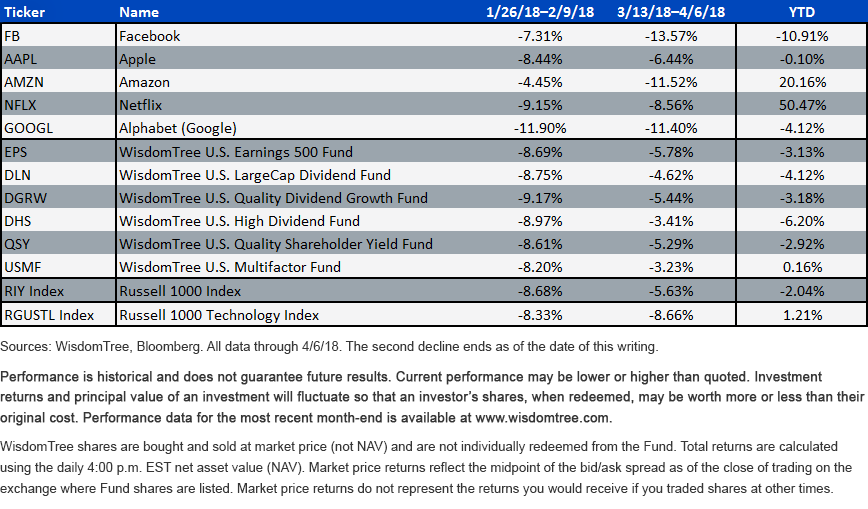De-FAANGing the Stock Market


There is no law that says that broad U.S. stock market engagement must include the so-called “FAANGs”—Facebook, Apple, Amazon, Netflix and Google (now named Alphabet). For example, the WisdomTree U.S. Multifactor ETF (USMF) holds 196 companies, not one of them a FAANG. The same goes for the WisdomTree U.S. High Dividend Fund (DHS),1 our $1 billion high-dividend ETF. In fact, the only WisdomTree ETF with FAANG exposure anywhere near that of the Russell 1000’s 10.2% is the WisdomTree U.S. Earnings 500 Fund (EPS), our 500-stock answer to the S&P 500.2
For most investors, the FAANG decision has for years rested on merit alone. Were they good investment prospects or not? Returning an annualized 46.0%, 19.8%, 36.1%, 70.8% and 24.4%, respectively, in the five years through 2017, the FAANG stocks handily outperformed the S&P 500, which was itself up an impressive 15.8% annually in that time.
But now we have #DeleteFacebook. The viral social media campaign implores users to close their accounts amid the revelation that the intimate information of 87 million users was given to Cambridge Analytica, the political data firm. There is a creeping sensation that there is now more to the FAANG investing question than just investment prospects. Some of these companies are bringing visions of George Orwell’s 1984.
The Facebook scandal came just weeks after the Russell 1000 Index of U.S. large caps completed a top-to-bottom 8.7% swoon (figure 1). FAANG stocks actually had a “good” bear raid in January and February; three of the five companies declined by less than the broad market.
But the March–April market declines are a different story for the FAANG stocks. All five are leading the market down in this episode. In this second decline, many WisdomTree U.S. equity ETFs have held up better than the market due to their reduced reliance on the FAANG five. Yet notice that even with tech struggling lately, both Amazon and Netflix are still up sharply year-to-date. Only USMF, our multifactor ETF, has been able to best the Russell 1000 thus far in 2018. But like the action in the last month or so, that may change if tech has problems the rest of the year.
Figure 1: Stock Market Performance, Last Two Declines

For standardized performance of the Funds mentioned in the chart, please click here.
Public Enemy: Big Tech?
Mark Zuckerberg, the Facebook founder, just testified to a politically ambitious Congress in a public event that was a top story for several days. No surprise then that the other cultivator of our most private information, Google, is scrambling to protect its brand as Silicon Valley’s reputation falters. Google has records of everywhere we’ve gone for the last decade, and now it knows that we know that it knows. As the uncomfortable joke goes, if Washington snooped on us like this, there would be armed rebellion, but with Google, “we gave it to them so that we can watch funny cat videos.”
Then there is the collective attention span killing and destruction of social grace via smartphones. A fear overhanging Big Tech is that the regulators will make those companies answer, somehow, to smartphone addiction. And even if this weren’t an issue, almost everyone already owns a device, so how will Apple convince people to buy another?
Amazon, the new Walmart3 in so many ways, is pilloried for what many view as unsavory business practices that undercut the competition. President Trump is upping the ante, accusing the company of using the U.S. Postal Service’s subsidized postage costs to price out competitors.
There is also a whole other set of FAANG-like companies that are not helping Big Tech’s reputation. Take Tesla.4 Its senior unsecured 2025 bonds made headlines by blowing out to close March at a yield of 7.55%.5 Then, on April 1—just days later—CEO Elon Musk posted an ill-timed April Fools’ tweet about Tesla going bankrupt and selling Easter eggs to raise cash. As for Twitter,6 the medium that Musk uses to communicate, that is another company in the FAANG-like coterie that is under pressure for its political influence. Angry voices from all persuasions argue that Twitter determines who holds the microphone.
And in this era of political activism via investment management, it is not much of a leap to see investor attitudes moving in the direction of placing some of these firms on the “no” list, along with tobacco/guns/casinos, or whatever bothers any of us. If it happens on a wide enough scale, the FAANG stocks and other Silicon Valley worthies could be in for a rude awakening. Washington or Brussels adding regulations is sugar on top.
FAANGs in WisdomTree Funds
With interrelated reputational risk like the kind that has cropped up in these five stocks, it may be time to question whether investing 10% of U.S. equity capital in them is wise. Figure 2 shows the FAANG exposure of six WisdomTree ETFs. Many of them can partly or completely help solve the problem.
Figure 2: FAANG Weightings

1Sources: WisdomTree, Bloomberg, as of 4/12/18 the total AUM of DHS is $1.02bn.
2Sources: WisdomTree, Bloomberg, as of 4/2/18. Holdings subject to change. EPS currently has 8.6% in the FAANGs. Click here for daily holdings of EPS.
3Please click on the following WisdomTree ticker symbol to see each Fund’s holdings percentage of Wal-Mart, EPS, DLN, QSY and USMF.
4As of 4/11/2018, the WisdomTree ETFs mentioned do not hold Tesla.
5Sources: Bloomberg, WisdomTree.
6As of 4/11/2018, the WisdomTree ETFS mentioned do not hold Twitter
Important Risks Related to this Article
There are risks associated with investing, including possible loss of principal. Funds focusing their investments on certain sectors increase their vulnerability to any single economic or regulatory development. This may result in greater share price volatility. Due to the investment strategy of these Funds, it may make higher capital gain distributions than other ETFs. While the QSY Fund is actively managed, the Fund’s investment process is expected to be heavily dependent on quantitative models and the models may not perform as intended. Please read each Fund’s prospectus for specific details regarding the Fund’s risk profile.
Statements concerning financial market trends are based on current market conditions, which will fluctuate. References to specific securities and their issuers are for illustrative purposes only and are not intended to be, and should not be interpreted as, recommendations to purchase or sell such securities.


